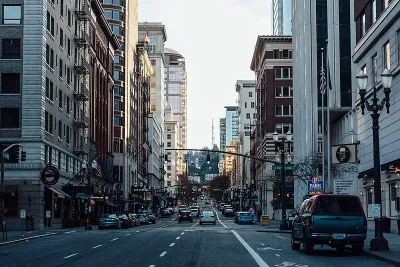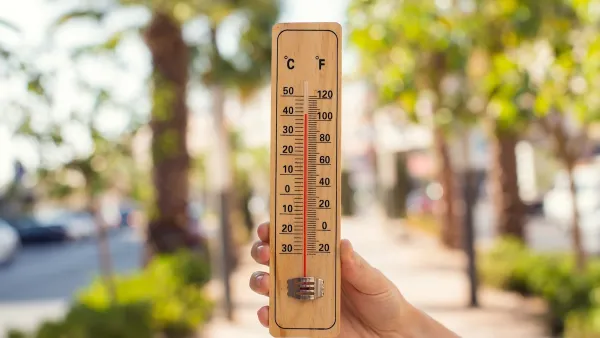The recent heat wave in the Pacific Northwest highlighted how historical inequities still affect the health and well-being of low-income and marginalized communities.

On the heels of the extreme heat waves that enveloped much of the Pacific Northwest this month, Yessenia Funes calls attention to the relationship between historic redlining and vulnerability to extreme temperatures, arguing that "the legacy of segregation across the U.S. exposes some neighborhoods more to this dangerous heat than others." Redlining, which for decades prevented Black families and other people of color from accessing home loans in affordable areas, continues to shape urban neighborhoods today. "The effects from this racist practice still linger—specifically (but not exclusively) through heat disparities."
"We don’t all experience heat the same," Funes writes. "There are unhoused people who are left exposed to the elements. There are incarcerated people stuck in hot cells who can’t advocate for themselves. And there are entire neighborhoods that grow hotter than others when temperatures rise." A study published in Climate "found that formerly redlined communities see, on average, a temperature increase of 4.7 degrees Fahrenheit (2.6 degrees Celsius) above non-redlined neighborhoods," due in part to tree canopy inequity and urban design choices. "Large roadways and buildings made of asphalt and concrete trap and emit heat," making parks and green spaces an important contributor to public health and a healthy environment. "[A]dd on top of that longer and stronger heat waves brought on by climate change, so it’s kind of a double whammy for a compounding inequity that is brought on by a global phenomenon amplifying a local phenomenon," says Jeremy Hoffman, the main author of the study and chief scientist at the Science Museum of Virginia.
Additionally, "[t]he people in neighborhoods who experience higher temperatures are often the same people suffering from food deserts, diabetes, asthma, air pollution, and housing vulnerability." And while local activists are working to create more green spaces and fight inequities in housing and public health, these organizations "really need the partnership of decision makers to enact policies that are in response to the ideas that we have." As climate change creates more dangerous weather conditions and extreme heat waves, the ability to stay cool must be addressed as a public health issue.
FULL STORY: ‘Patterns of Discrimination’: How Redlining Fueled the Heat Wave

Analysis: Cybertruck Fatality Rate Far Exceeds That of Ford Pinto
The Tesla Cybertruck was recalled seven times last year.

National Parks Layoffs Will Cause Communities to Lose Billions
Thousands of essential park workers were laid off this week, just before the busy spring break season.

Retro-silient?: America’s First “Eco-burb,” The Woodlands Turns 50
A master-planned community north of Houston offers lessons on green infrastructure and resilient design, but falls short of its founder’s lofty affordability and walkability goals.

Test News Post 1
This is a summary

Analysis: Cybertruck Fatality Rate Far Exceeds That of Ford Pinto
The Tesla Cybertruck was recalled seven times last year.

Test News Headline 46
Test for the image on the front page.
Urban Design for Planners 1: Software Tools
This six-course series explores essential urban design concepts using open source software and equips planners with the tools they need to participate fully in the urban design process.
Planning for Universal Design
Learn the tools for implementing Universal Design in planning regulations.
EMC Planning Group, Inc.
Planetizen
Planetizen
Mpact (formerly Rail~Volution)
Great Falls Development Authority, Inc.
HUDs Office of Policy Development and Research
NYU Wagner Graduate School of Public Service




























